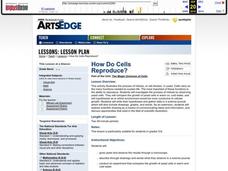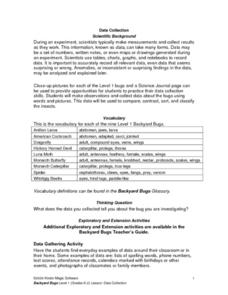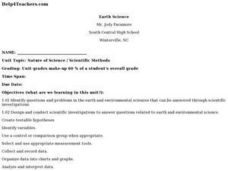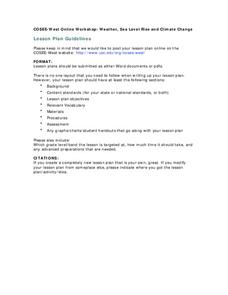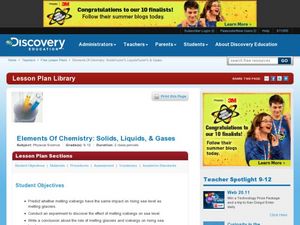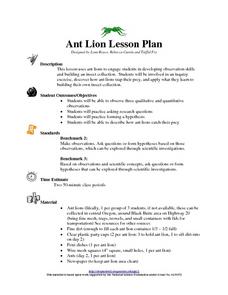Curated OER
Alka-Seltzer Cannons
Fourth graders examine how to conduct a reliable scientific experiment so that the results are valid. They compare and contrast the reaction of Alka-Seltzer tables, one whole and one crushed, and time how long each takes to pop the top...
Curated OER
How Do Cells Reproduce?
Beginning biologists prepare a sugar solution for yeast cells to live in, and divide it into two different jars. Samples from each jar are viewed with a microscope, and then one jar is placed in a warm environment and the other a cold...
Curated OER
Who Done It?
Pick and choose which activities to include in this crime scene investigation. Junior detectives can examine fingerprints, DNA, blood samples, or bone structure. The plan suggests you have teams solve a mystery, but it does not...
Cornell University
Mechanical Properties of Gummy Worms
Learners won't have to squirm when asked the facts after completing an intriguing lab investigation! Hook young scholars on science by challenging them to verify Hooke's Law using a gummy worm. Measuring the length of the worm as they...
Curated OER
Science: Backyard Bugs Data Collection
Students practice data collection skills by observing common bugs found in their local environment. Once the data is collected they complete data sheets to compare, contrast, sort, and classify the insects. The instructional activity...
Curated OER
Spring Collecting and Identifying Bumble Bees
Students collect bumble bees in the field, record data, identify and release specimens, answer conclusion questions, and send data in to researcher leaders. They make research based conclusions based upon the evidence.
Curated OER
Watershed Analysis
Students conduct a regional watershed analysis of an area of their choosing. Using on-line data and their personal knowledge of the area, they determine the annual hydrologic budget and teach the class about "their" watershed.
Curated OER
Data Collection and Record Keeping. Measuring Larval Growth and Development
Students keep data records of the growth of Monarch larvae. The observations are made with the change of each stage of development. The observations are to stimulate the answering of questions about biological development.
Curated OER
Earth Science/ Scientific Methods
Middle schoolers identify questions and problems in the earth and environmental sciences that can be answered through scientific investigations. They design and conduct scientific investigations to answer questions related to earth and...
Curated OER
A "Sedimental" Journey-Sediment Collection
Students are asked how they would gather a sample of sediment from a lake, stream, river, pond, or swamp. They discuss safety concerns involving sample collections. Students are instructed to stay out of the water and to be careful not...
Curated OER
Natural Dyeing with Plants - Scientific Method
Students study the components of scientific investigation by planning and carrying out an experiment in natural dyeing, seeing if different kinds of metal dye pots affect the color one gets from the same plant material.
Curated OER
School Lighting Audit Action Plan
Learners write a school lighting audit action plan from the data they collected in previous lessons. They develop a presentation that shows the results of the data and their recommendations. They present their action plan to their...
Curated OER
Weather, Sea Level Rise and Climate Change
Eighth graders compare and contrast weather and climate. In this earth science lesson, 8th graders research weather data site and analyze historical data. They present their findings in class and explain identifiable trends.
Curated OER
Making Paper
Students explore paper making. In this cross curriculum multicultural ecology and art lesson, students follow written and oral instructions to make paper using common household items. Students predict the amount of paper use in their...
Curated OER
Biodiversity Study -- A Unit Study
Young scholars sample a site with low human impact, one with moderate human impact, and a third with high human impact. Students chart the data for each site and then compare the sites and discuss.
Curated OER
Elements of Chemistry: Solids, Liquids and Gases
Students predict if icebergs melting has an effect on the sea level rising. In this global warming instructional activity students complete an experiment to see the effects of melting icebergs and write a conclusion on their data...
Curated OER
Designing a Scientific Study
Students define an exploration question or hypothesis and design a scientific study to answer it. They conduct the experiment.
Cornell University
Fibers, Dyes, and the Environment
Nanofibers can be made through electrospinning or force spinning in order to reduce the negative impact on the environment. Pupils study the role of fibers and dye on the environment through a series of five hands-on activities. Then,...
Science 4 Inquiry
Edible Plate Tectonics
Many people think they can't observe plate tectonics, but thanks to GPS, we know that Australia moves at a rate of 2.7 inches per year, North America at 1 inches per year, and the Pacific plate at more than 3 inches per year! Scholars...
Curated OER
The Chesapeake Bay in Captain John Smith's Time
When Captain John Smith visited the Chesapeake Bay in the summer of 1608, what types of animals and habitats did he encounter? Your young historians will analyze primary source documents to answer this question, as well as compare...
Center Science Education
Model a Moving Glacier
Glaciologists in your class make models of glaciers to simulate how they move down a valley, and then they use it to test any aspect of glacier movement. Not only is this a vivid visual of how these monsters of ice flow, but it is also...
Curated OER
Ant Lion Lesson Plan
Learners observe three qualitative and quantitative observations. The students further practice the follwoing: asking research questions,forming a hypothesis, and describe how ant lions catch their prey. Learners also form hypotheses...
Curated OER
Trundle Wheel
Sixth graders explore the uses of a trundle wheel. In this units of measurement lesson, 6th graders use trundle wheels to measure distances.
Curated OER
Human Evolution
Students make and use observations of Laetoli footprints to provide clues to life in the past. They collect and analyze data to study the relationship between foot length and body height.

